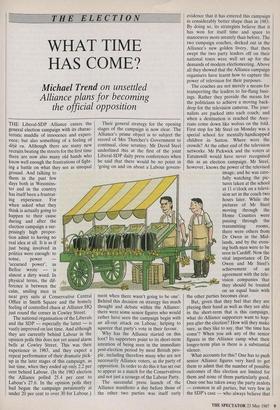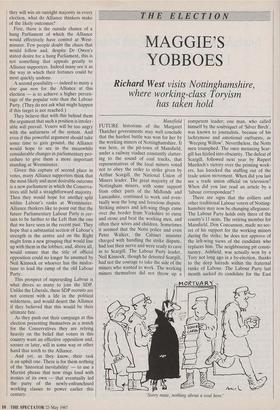THE ELECTION
WHAT TIME HAS COME?
Michael Trend on unsettled
Alliance plans for becoming the official opposition
some, power
The national organisation of the Liberals and the SDP — especially the latter — is vastly improved on last time. And although they are currently behind Labour in the opinion polls this does not yet sound alarm bells at Cowley Street. This was their experience in 1983, and they expect a repeat performance of their dramatic pick- up in the later stages of this campaign, as last time, when they ended up only 2.2 per cent behind Labour. (In the 1983 election the Alliance polled 25.4 per cent to Labour's 27.6. In the opinion polls they had begun the campaign persistently at under 20 per cent to over 30 for Labour.)
Their general strategy for the opening stages of the campaign is now clear. The Alliance's prime object is to subject the record of Mrs Thatcher's Government to continual, close scrutiny. Mr David Steel underlined this at the first of the joint Liberal-SDP daily press conferences when he said that there would be no point in `going on and on about a Labour govern-
ment when there wasn't going to be one'. Behind this decision on strategy lies much thought and debate within the Alliance: there were some senior figures who would rather have seen the campaign begin with an all-out attack on Labour, helping to squeeze that party's vote in their favour.
Why has the Alliance started on this foot? Its supporters point to its short-term intention of being seen in the immediate post-election period by most British peo- ple, including therefore many who are not necessarily Alliance voters, as the party of opposition. In order to do this it has set out to appear as a match for the Conservatives and not just a scourge of the Labour Party.
The successful press launch of the Alliance manifesto a day before those of the other two parties was itself early evidence that it has entered this campaign in considerably better shape than in 1983. By doing so, its strategists believe that it has won for itself time and space to manoeuvre more astutely than before. The two campaign coaches, decked out in the Alliance's new golden livery, that then swept the two party leaders off on their national tours were well set up for the demands of modern electioneering. Above all they showed that the Alliance campaign organisers have learnt how to capture the power of television for their purposes.
The coaches are not merely a means for transporting the leaders to far-flung hust- ings. Rather they provide the means for the politicians to achieve a moving back- drop for the television cameras. The jour- nalists are packed into each coach; and when a destination is reached the Assy- rians come down like wolves on the fold. First stop for Mr Steel on Monday was a special school for mentally-handicapped children in Sutton. Where were the crowds? At the other end of the television networks. Mr Pickwick and the voters at Eatanswill would have never recognised this as an election campaign. Mr Steel, however, knows the power of the televised image; and he was care- fully watching the pic- tures taken at the school at 11 o'clock on a televi- sion set in the coach two hours later. While the pictures of Mr Steel moving through the Home Counties were passing through the transmitting rooms, there were others from Dr Owen in the Mid- lands, and by the even- ing both men were to be seen in Cardiff. Now the vital importance of Dr Owen and Mr Steel's achievement of an agreement with the tele- vision companies that they should be treated on an equal basis with the other parties becomes clear.
But, given that they feel that they are playing their hand as well as they are able in the short-term that is this campaign, what do Alliance supporters want to hap- pen after the election? How will they make sure, as they like to say, that 'the time has come'? When you ask any of the senior figures in the Alliance camp what their longer-term plan is there is a substantial silence.
What accounts for this? One has to push senior Alliance figures very hard to get them to admit that the number of possible outcomes of this election are limited for them and none of them particularly good, Once one has taken away the party zealots — common in all parties, but very few in the SDP's case — who always believe that
they will win an outright majority in every election, what do Alliance thinkers make of the likely outcomes?
First, there is the outside chance of a hung Parliament of which the Alliance would effectively have control at West- minster. Few people doubt the chaos that would follow and, despite Dr Owen's stated desire for a hung Parliament, this is not something that appeals greatly to Alliance supporters. Indeed many see it as the way in which their fortunes could be most quickly undone.
A second possibility — indeed to many a sine qua non for the Alliance at this
election — is to achieve a higher percen- tage of the popular vote than the Labour Party. (They do not ask what might happen if this target is not reached.) They believe that with this behind them the argument that such a position is intoler- able will prevail. Voters will be too angry with the unfairness of the system. And even if this powerful argument should take some time to gain ground, the Alliance would hope to see in the meanwhile considerable changes in parliamentary pro- cedure to give them a more important standing at Westminster.
Given this capture of second place in votes, many Alliance supporters think that the most likely and most desirable outcome is a new parliament in which the Conserva- tives still held a straightforward majority.
Then they would hope for another split within Labour's ranks at Westminster. Alliance thinkers like to point out that the future Parliamentary Labour Party is cer- tain to be further to the Left than the one that we have seen in the recent past. They hope that a substantial section of Labour's strength in the centre and on the Right might form a new grouping that would line up with them in the lobbies; and, above all, would ensure that the title of official opposition could no longer be assumed by Neil Kinnock or whoever has the misfor- tune to lead the rump of the old Labour Party.
This prospect of superseding Labour is what drives so many to join the SDP.
Unlike the Liberals, these SDP recruits are not content with a life in the political wilderness, and would desert the Alliance if they believed that this would be their ultimate fate.
As they push out their campaign at this election presenting themselves as a match for the Conservatives they are relying heavily on the belief that voters in this country want an effective opposition and, sooner or later, will in some way or other hand that torch to the Alliance.
And yet, as they know, their task is an uphill one. There is for them nothing of the 'historical inevitability' — to use a Marxist phrase that now rings loud with ironies of its own — that eventually led the party of the newly-enfranchised working classes to power earlier this century.










































































 Previous page
Previous page